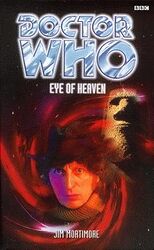
 |  |  |

 | Reviews for Eye of Heaven |
|
 |  |  |
There are 4 reviews so far. To add a review of your own for this item, visit the voting page.
| By: | Stephen Carlin, Northern Ireland |
|
| Date: | Wednesday 3 March 2004 |
|
| Rating: |    1 1 |
From almost the first chapter I hated this book. At first glance it is an interesting idea - the story is told from Leela's perspective. Unfortunately that is as good as it gets. For those familiar with Leela and her on-screen adventures there are too many errors. Her perspective seems curiously well-informed in some scenes as if the author is incapable of finding suitable descriptions for objects that should be beyond Leela's experience.
Another aspect of the book is that the story is told from different points in time. It darts between past, present and future events. I came away with the strong impression that Mortimore had written disparate chapters and then found he could not piece them together...so he just shoved them altogether in the hope that people would sit back and think he was being clever. There are too many gaps, too many events that are not recounted for this to be a carefully planned and inspired method of story-telling.
In short, this is a mess of a book, badly written with appalling characterisation.
 |  |  |

 | Not the best, but not bad either |
|
 |  |  |
| By: | Matt Saunders, Buckinghamshire, United Kingdom |
|
| Date: | Friday 13 January 2012 |
|
| Rating: |    7 7 |
This is an interesting novel, because it's written from Leela's point of view. Nowadays we're too used to this because of the Big Finish Companion Chronicles, but this was a first for the novels. Mortimore doesn't get it right every time, but it's not that bad. Plus, it's a cracking story and idea, and that's got to be good. :)
| By: | Trevor Smith, Nottingham, United Kingdom |
|
| Date: | Wednesday 12 June 2013 |
|
| Rating: |    5 5 |
I read this book a couple of years ago but can't remember anything about it apart from being so dull.
| By: | David Layton, Los Angeles, United States |
|
| Date: | Thursday 6 October 2016 |
|
| Rating: |    6 6 |
Jim Mortimore has an interesting science-fictional idea regarding the moai on Rapa Nui, but takes far too long to get to it. Instead, he has written a rather standard rollicking adventure book that goes from one brush with death to another, fight after fight, that never seems to advance the plot. All of this leaves the science-fictional idea, which is the generator of the plot, rushed through in the last 20 pages or so. Here is the book we get. The Doctor has in answer to an ad for a reason that we are never told, met a man who has been broken by his memory of an item he stole from Rapa Nui, the stealing of which caused the deaths of two friends. The Doctor on a whim decides to pay for the expedition. The bulk of the novel is taken by the sea voyage to Rapa Nui. Here, Mortimore throws every adventure novel cliché he can think of into the mix. There are dangerous thieves, cut-throat sailors, storms, water spouts, and even pirates. Leela and a character get swept off the boat and manage in some preposterous fashion to ride a whale to safety, well almost, but then Mortimore has the events after the whale dies just raced through by one character and then forgotten, as though Mortimore knew had stretched things too far. Another key problem with the novel is the manner in which the story is told. It is all in first person, but from different characters' perspectives. The one who gets the most narrative space is Leela. Mortimore's characterization of Leela makes her far too savage and superstitious, especially if the story is taking place after "The Talons of Weng Chiang." On the other hand, she knows too much, especially about all the terms of 19th-century sailing. The next problem area of the narrative is that Mortimore has broken up the chronology, so that chapters do not follow from preceding chapters but relate to much earlier or much later events. This is a needless complication. It could have worked had Mortimore taken a straighter path and concentrated on the science-fiction end of the story.


